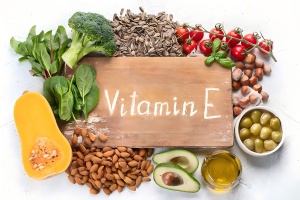Vitamin E: Benefits, Sources, Dosage, and Side Effects

Vitamin E is a fat-soluble nutrient that's essential for your body's overall well-being, acting as a powerful antioxidant to shield cells from damage caused by free radicals. Found naturally in various foods, it plays a key role in maintaining skin health, supporting immune function, and promoting heart wellness. With ongoing research highlighting its potential in preventing certain diseases, understanding this vitamin can help you make informed choices about your diet and supplements.
Key Benefits of Vitamin E
This vitamin offers a range of advantages that go beyond basic nutrition, influencing everything from cellular protection to disease prevention.
Antioxidant Protection Against Oxidative Stress
Vitamin E excels at neutralizing free radicals, which are unstable molecules that can harm cells and contribute to aging and chronic conditions. By doing so, it helps reduce oxidative stress, potentially lowering the risk of heart disease and certain cancers. For instance, studies show that adequate intake may support cardiovascular health by preventing the oxidation of LDL cholesterol, which can lead to plaque buildup in arteries.
Support for Skin Health and Healing
Many people turn to vitamin E for its skin benefits, as it aids in maintaining moisture and protecting against UV damage. Topical applications, like in creams, can speed up wound healing and reduce scarring by promoting collagen production. Research indicates it may also alleviate symptoms of conditions like eczema, making it a popular ingredient in skincare routines.
Immune System Boost and Inflammation Reduction
Vitamin E enhances immune responses by supporting the production of antibodies and white blood cells. This is particularly helpful during cold seasons or for older adults whose immunity may weaken. Additionally, its anti-inflammatory properties can ease joint discomfort and support overall inflammatory balance in the body.
Potential Role in Eye and Brain Health
Emerging evidence suggests vitamin E contributes to eye health by protecting against age-related macular degeneration through its antioxidant effects. For brain function, it may help slow cognitive decline in conditions like Alzheimer's disease, with some trials showing benefits in mild to moderate stages when taken in higher doses.
Natural Sources of Vitamin E
Incorporating vitamin E into your diet is straightforward, as it's abundant in everyday foods that add flavor and nutrition to meals.
Plant-Based Oils and Nuts
Sources like sunflower oil, almonds, and hazelnuts are rich in vitamin E. Just a handful of nuts can provide a significant portion of your daily needs, making them an easy snack for on-the-go energy.
Vegetables and Fruits
Leafy greens such as spinach and broccoli, along with fruits like kiwi and mango, offer vitamin E alongside other vitamins. These can be blended into smoothies or salads for a refreshing boost.
Animal Products and Fortified Foods
Eggs, fatty fish, and fortified cereals also contribute to intake. For vegetarians, focusing on plant sources ensures you meet requirements without supplements.
Recommended Dosage Guidelines
Getting the right amount of vitamin E is crucial, as both deficiency and excess can impact health.
Daily Intake Recommendations
Adults typically need about 15 mg (22 IU) per day from natural sources. Pregnant women may require slightly more, around 19 mg, to support fetal development.
Supplement Considerations
If your diet lacks variety, supplements can help, but stick to doses under 400 IU to avoid risks. Always consult a doctor, especially if you have conditions like bleeding disorders.
Absorption Tips for Maximum Effectiveness
Since it's fat-soluble, pair vitamin E-rich foods with healthy fats, like adding avocado to salads, to enhance absorption.
Potential Side Effects and Risks
While generally safe, high doses of vitamin E can lead to complications, so moderation is key.
Common Mild Reactions
Some experience nausea, diarrhea, or headaches from supplements exceeding 800 IU daily.
Serious Health Concerns
Excess intake may increase bleeding risks, especially for those on blood thinners, and recent studies link high doses to higher mortality or prostate cancer risks in men.
Interactions with Medications
It can interfere with chemotherapy or statins, so discuss with healthcare providers before starting supplements.
Latest Research on Vitamin E
Recent studies as of 2025 continue to explore vitamin E's broader applications and limitations.
Advances in Disease Prevention
Trials indicate potential in reducing liver disease progression and supporting metabolic health in diabetes patients.
Emerging Concerns from High-Dose Studies
New data warns against long-term high supplementation, emphasizing food sources for safer benefits.
Future Directions and Guidance
Researchers recommend personalized approaches based on genetics and lifestyle, suggesting regular blood tests to monitor levels for optimal health outcomes.
